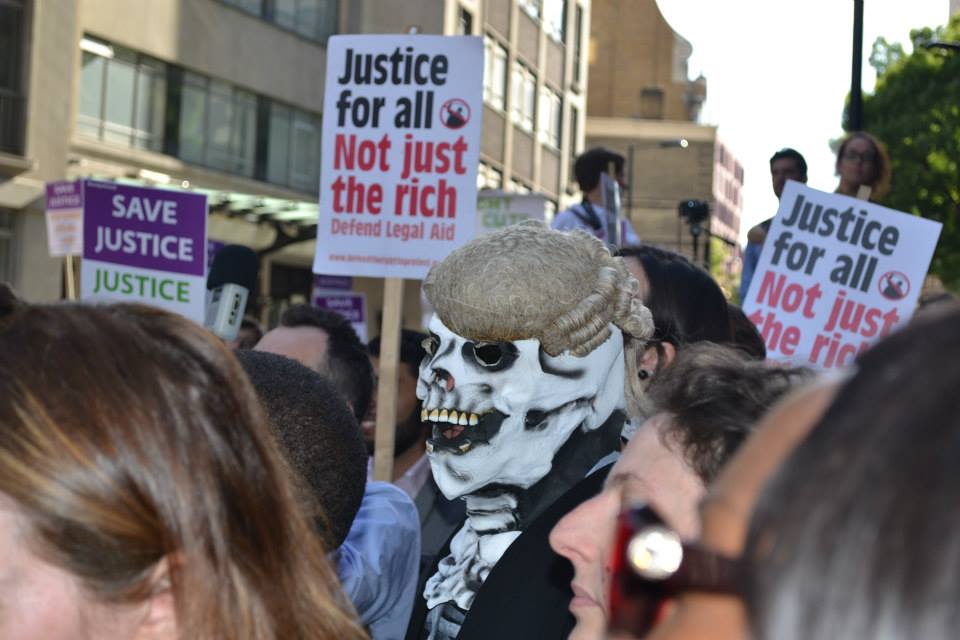Fat cats or poor hacks? A former criminal barrister writes
Since 1 April, criminal barristers in England and Wales have been refusing to go to court.
What has incensed our learned friends so much as to leave defendants unrepresented in the dock? The latest wave of cuts to legal aid that would bring an already creaking criminal justice system to its knees.
According to comments on social media, however, many members of the public are unmoved:
Will they now have to drive Porches instead of Lamborghinis?
One phone call to [my] lawyer and two letters written by [my] lawyer. Bill was over £500. Difficult to justify how much they charge!
Sadly, many people like the commenters above confuse legal aid work, which is publicly funded, with private work. They’re therefore probably unaware that some barristers earn as little as £12,000 per year.
Here’s how—and why you should care.
Legal aid work involves barristers representing people who can’t afford to pay privately. Those barristers aren’t paid by the people they represent, but by the state. The vast majority of criminal cases are publicly funded, and many involve representing some of the most vulnerable people in society—including children, the mentally ill and the homeless.
Many barristers take on exclusively (or almost exclusively) legal aid work—I was one, and for many years I did. In criminal cases, it’s common for barristers early on in their career to represent someone at court for under £100—and sometimes as little as £50 (here).
That includes all case preparation, travel time (often to another part of the country), time spent in conference with the client, time spent waiting to get called on, time spent in court, time spent advising the client and their solicitor on the result (potentially including the prospect of an appeal) and time spent writing up a record of all of the above afterwards.
From that figure, the barrister (who’s typically self-employed) will take off their travel costs; their clerks’ fees (typically 10–20 per cent of the barrister’s fee); their practising certificate, professional membership and annual training fees; the cost of their legal reference books (hundreds of pounds); and the cost of their wig, gown and other required items of court dress (hundreds of pounds).
That’s before tax.
It’s not difficult to see how many barristers can earn well below the minimum wage—or even end up paying to go to court. In my first year as a barrister living in London in 2008, I was in court five or six days a week (including some Saturdays) and preparing cases at home on Sundays.
For my efforts I earned the princely sum of £10,000.
Since around that time, repeated cuts to legal aid have meant barristers’ fees have plummeted more than 40 per cent in real terms (here).
Can you think of any other profession that has faced anywhere near this level of swingeing cuts?
But this isn’t about legal aid barristers whinging about how little they’re paid—no one does this job for the money. It’s about protecting access to justice.
Fewer people are now eligible for legal aid, meaning many are left to represent themselves in the criminal, family and civil courts in cases that can have life-changing consequences for them.
I can’t count the number of elderly and mentally ill defendants I’ve seen arguing their case alone in front of a judge, fighting for their liberty. It’s absolutely shameful.
It’s also crucial for justice that the criminal bar attracts the best and the brightest from a wide range of backgrounds. It has become nigh on impossible for students who aren’t from privileged, middle-class families, backed up by the bank of mum and dad, to thrive—or even survive—as criminal barristers. Some have even spoken out about being unable to afford their train ticket to court or relying on their Boots Advantage Card to be able to afford lunch (here).
These situations aren’t uncommon, and they show how little successive governments have valued our criminal justice system.
Yes, the most experienced criminal barristers—QCs and the like, who’ve been working for decades and deal with complicated and high-profile murder and terrorism trials—are paid very well. But they’re absolutely not representative of the criminal bar, despite the fat-cat stereotype the tabloids love to peddle.
The question is: why on earth would someone want to become a criminal barrister nowadays—to rack up huge amounts of debt in university fees and the necessary further years of training to earn a pittance for what is extremely hard work, with no minimum wage, no maternity leave, no paid holidays and no pension?
I applaud the criminal barristers now refusing to work in protest. And I’d be joining them too, if I hadn’t already thrown in the towel and left the bar two years ago.
This article was first published on June 1, 2018






